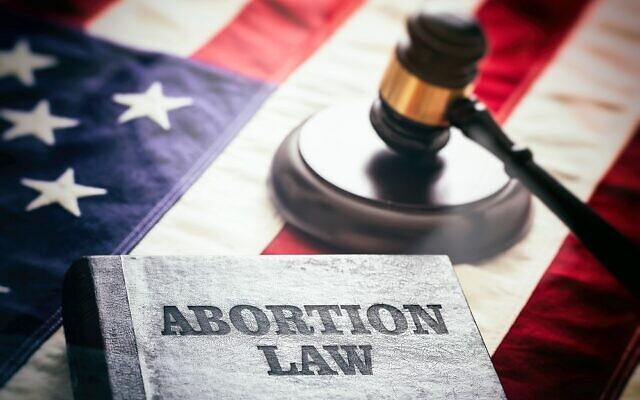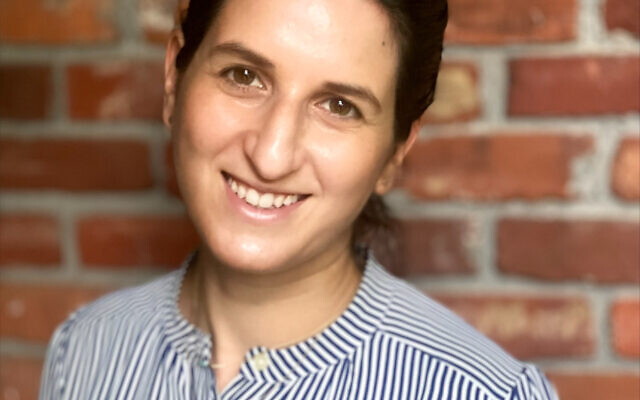Jewish Abortion Rights Advocates Laud Judge’s Ruling
Six-week abortion ban was deemed unconstitutional; state is appealing.

In mid-November, when Dr. Lisa Haddad heard the news that a Fulton County Superior Court judge had struck down Georgia’s ban on abortion after six weeks of pregnancy, she felt that her decision to become a plaintiff in the case was validated.
“As a doctor, as a mother, as a woman and as a Jew are all why it was important to stand up to fight for what I believe,” said Haddad, medical director at the Population Council Center for Biomedical Research and an Emory University adjunct associate professor. “I’m so happy and proud of many physicians and others who spoke out during the case and provided their testimony in a way that was so critical in representing their patients,” said Haddad, a mother of three.
Haddad was one of several doctors who took the case to court, along with the American Civil Liberties Union (ACLU), the ACLU of Georgia, the Center for Reproductive Rights, Planned Parenthood Federation of America, Planned Parenthood Southeast, Inc., Atlanta Comprehensive Wellness Clinic, Atlanta Women’s Medical Center, and law firms on behalf of SisterSong Women of Color Reproductive Justice Collective.

Fulton County Superior Court Judge Robert McBurney ruled that the six-week abortion ban, enacted in 2019, was void from the beginning because the Georgia Constitution prohibits the legislature from passing laws that violate federal constitutional precedent. At the time, the U.S. Supreme Court’s 1973 ruling in Roe v. Wade, allowing abortions nationwide, still stood and a federal district court blocked the Georgia law.
In June, the current U.S. Supreme Court voted against the nearly 50-year precedent in the Dobbs v. Jackson Women’s Health Organization case. Three weeks later, the 11th Circuit Court of Appeals lifted a district court’s injunction against the Georgia law.

That court also ruled that the six-week ban could go into effect immediately, with no warning to health care providers and patients across the state and creating a crisis in the medical community. On June 26, the plaintiffs responded by filing their constitutional challenge against the law, H.B. 481, commonly called “the heartbeat ban.”
Judge McBurney ruled that the Dobbs change in federal constitutional law did not revive the Georgia ban because it was enacted and signed by Gov. Brian Kemp in 2019 when it was unconstitutional to do so. McBurney wrote in his order that if the legislature wants to ban abortion, it must pass a new law “in the sharp glare of public attention that will undoubtedly and properly attend such an important and consequential debate.”
Cory Isaacson, ACLU legal director, pointed out that when H.B. 481 was passed, it won by only one vote and “they couldn’t even get all Republicans on board. It was pure political grandstanding” because they knew it wasn’t going to go into effect. “The people who voted for it knew it was unconstitutional.”

Georgia law reverts to a pre-existing 20-week ban, she adds. The guideline provided by Roe v. Wade was based on viability, which is generally around 22 weeks, according to Isaacson.
“I was not surprised” by McBurney’s ruling, Isaacson said, “because I think that is the issue easiest for the judge to rule on. It’s pretty straightforward. This is a judge who understood the weight of the issue before him” and how people were impacted by the law.
Isaacson was surprised, at first, that the state didn’t ask for a stay of decision initially. However, the Friday before Thanksgiving, the state did make that request and the day before Thanksgiving, the Georgia Supreme Court granted the stay. “So the ban [against abortion] is back in effect, at least for now. I’m still hopeful that we have a chance to prevail; we still go through the full appellate process. But for now, it’s very disappointing news.”
Isaacson said she is always an optimist as the case heads to the state supreme court. “I think we’re going to win. It’s an open and shut legal issue which the courts have reaffirmed.”
Immediately after McBurney’s decision, abortion clinics were fielding dozens of calls from women eager to end pregnancies that they may have had to cross state lines to obtain. “They are happy and relieved that they can get care. They were in tears when they were turned away before. The women I have seen are of all ages and ethnicities,” said Dr. Mimi Zieman, co-vice president of advocacy for the National Council of Jewish Women Atlanta Section, and an obstetrician and gynecologist.
Stacey Hader Epstein, co-president of the NCJW Atlanta Section, told the AJT, “Speaking on behalf of NCJW Atlanta Section and our more than 40 Rabbis/Clergy for Repro across the metro Atlanta area, we are pleased with Judge McBurney’s ruling for it allows women, once again, to make their own decisions about their bodies and healthcare. We know that this struggle over women’s healthcare and abortion care is far from over, but today, we’re cautiously optimistic that women in Georgia will continue to receive the care they seek, at least for now.”
NCJW Atlanta Section also released a statement agreeing with McBurney’s ruling, saying that the abortion ban “was clearly unconstitutional when enacted…The ban has caused irreparable harm to Georgia women. We hope that members of the new Georgia legislature understand that an abortion ban is inconsistent with the wishes of a vast majority of Georgia’s citizens.”
And not only are Georgia’s citizens in favor of abortion rights. “We’ve seen it in races across the country,” said Dr. Zieman. The American College of Obstetricians and Gynecologists states that “abortion care is essential health care,” as Zieman repeatedly points out. She said that carrying a pregnancy to term comes with a risk of death that can be 40 times greater than the risk associated with early legal abortion. Georgia already has one of the highest maternal mortality rates in the country.
“Women in Georgia are twice as likely to die in pregnancy than women on average in the U.S.,” said Dr. Haddad. “Policies that restrict abortion hurt women. This is a fact.” Focusing on the Jewish perspective, she added that “abortion access is an issue of ‘pikuach nefesh,’” which means preservation of life, and this overrides nearly every other commandment.
Women in Georgia are twice as likely to die in pregnancy than women on average in the U.S. Policies that restrict abortion hurt women. This is a fact.
ACLU’s Isaacson, who describes herself as an observant woman and a member of Congregation Ohr HaTorah, asserts that there is a “serious religious issue” with abortion bans as well. “There’s no question that it violates Jewish women’s rights,” she said, noting that halacha, or Jewish law, allows abortion if continuing a pregnancy impacts the woman’s mental health, unlike H.B. 481.
An Atlanta native, Isaacson said that ACLU is “starting to look at” the religious aspect of abortion restrictions. Now with the Fulton County Superior Court’s decision, “hopefully we won’t have to.”
- News
- Local
- Jan Jaben-Eilon
- Dr. Lisa Haddad
- Abortion
- Reproductive rights
- Roe v. Wade
- Fulton County Superior Court
- Population Council Center for Biomedical Research
- Emory University
- American Civil Liberties Union
- Center for Reproductive Rights
- Planned Parenthood Federation of America
- Planned Parenthood Southeast
- Inc.
- Atlanta Comprehensive Wellness Clinic
- Atlanta Women’s Medical Center
- SisterSong Women of Color Reproductive Justice Collective
- Judge Robert McBurney
- Dobbs v. Jackson Women’s Health Organization
- Dr. Mimi Zieman
- National Council of Jewish Women/Atlanta section
- Stacey Hader Epstein
- Congregation Ohr HaTorah



comments